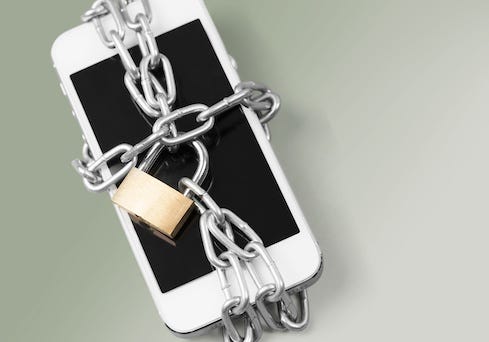10 iOS Security Tips to Lock Down Your iPhone
Mobile security experts share their go-to advice for protecting iPhones from hackers, thieves, and fraudsters.

Now more than ever, we depend on smartphones to keep us connected to each other, to our employers, to our finances and healthcare providers. We use our phones to shop, bank, and access corporate applications and information. But are our iPhones as secure as they could be?
"iPhone owners tend to feel more confident in the security of their phones than Android owners, and for good reason," says Randy Pargman, former FBI computer scientist and senior director of threat hunting and counterintelligence at Binary Defense.
But that doesn't mean iOS is immune to security issues. Back in April, we learned attackers has been exploiting two unpatched iOS vulnerabilities since at least January 2018. Last year, researchers discovered more than 20,000 iOS apps were published without App Transport Security (ATS), a set of rules and app extensions Apple built as part of the Swift development platform. ATS is turned on by default; without it, critical information was being transported without encryption.
"It's true that iPhones and the whole Apple ecosystem keep customers safer from malicious apps, but that doesn't mean that all the data stored in the apps is safe from theft," Pargman continues. "Many apps store sensitive information on servers operated by the app developer or transfer the information unencrypted over the Internet. As soon as your information leaves your iPhone, it is outside of your control to protect it."
The security of iOS doesn't mean users can ignore basic threats to data security. Most people don't have to worry about advanced targeted attacks or zero-day exploits; however, they are still exposed to phishing attacks, device theft, and malware that could put their information at risk. If you're using Safari or another browser to navigate the Web, share data, or order goods, you're just as vulnerable on your iPhone as you would be on Windows or Android. Those who store financial, health, and other sensitive data on their iPhones should take extra precautions.
These precautions are even more essential at a time when people are relying on their iPhones to work remotely. Wandera research shows collaboration software adoption jumped nearly 190% between early February and the end of April, says Michael Covington, vice president of product strategy at Wandera.
"Though mobile devices have been broadly adopted within the workforce, COVID-19 has forced many businesses to finally put those devices to use, with more enterprise applications being opened up to mobile devices and remote access finally being allowed," he says.
Many businesses have changed data access policies to enable access for remote users.
"From work files to health records and banking data, the pandemic has forced more frequent use of the mobile device as people try to stay productive and connected, while balancing the needs of entire families now forced to work with a limited set of shared resources," Covington says.
Many people who have been isolated at home have started to let their guard down when it comes to practicing strong security, Covington says. Phishing attacks are taking advantage of the pandemic, preying on global fear and uncertainty, increasing their chances of getting hit.
Now is a good time to take a closer look at your iPhone security posture. More than 20 mobile security experts weighed in to share their go-to tips to strengthen privacy and security of your mobile device. Here, we share their most popular suggestions and tips you may not think of.
What did we miss? Feel free to share your favorite iPhone security advice in the Comments section, below.
About the Author(s)
You May Also Like
Key Findings from the State of AppSec Report 2024
May 7, 2024Is AI Identifying Threats to Your Network?
May 14, 2024Where and Why Threat Intelligence Makes Sense for Your Enterprise Security Strategy
May 15, 2024Safeguarding Political Campaigns: Defending Against Mass Phishing Attacks
May 16, 2024Why Effective Asset Management is Critical to Enterprise Cybersecurity
May 21, 2024
Black Hat USA - August 3-8 - Learn More
August 3, 2024Cybersecurity's Hottest New Technologies: What You Need To Know
March 21, 2024




